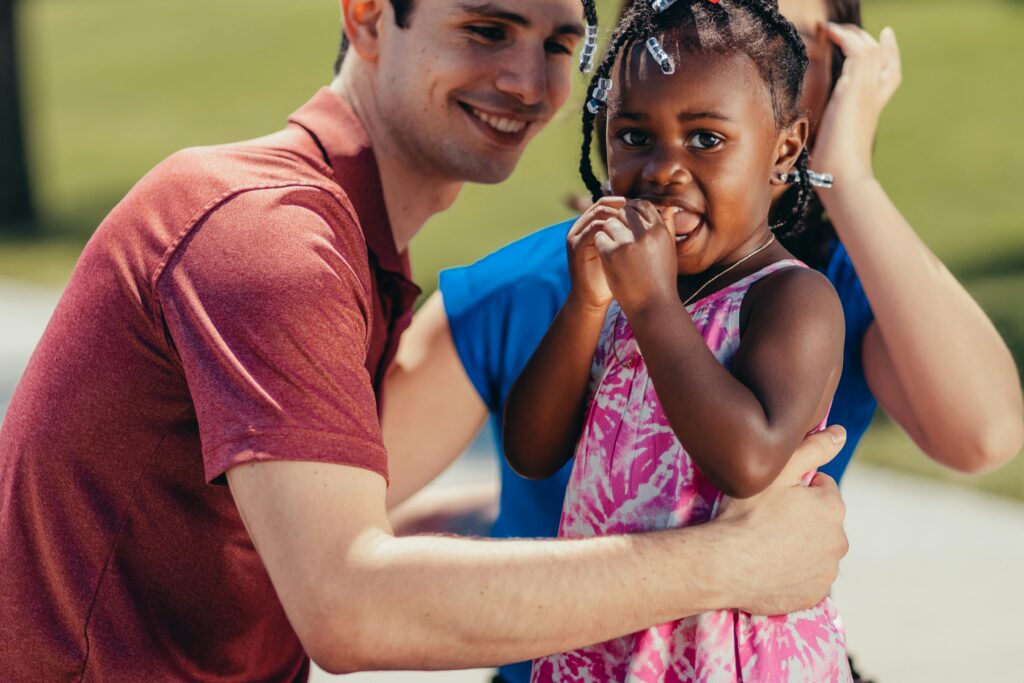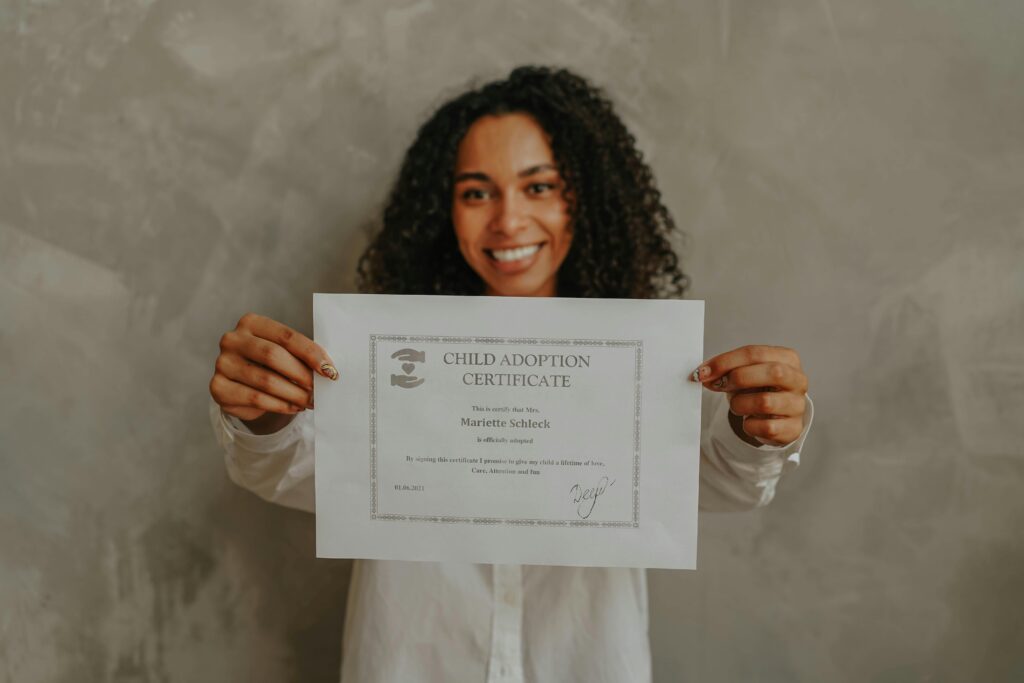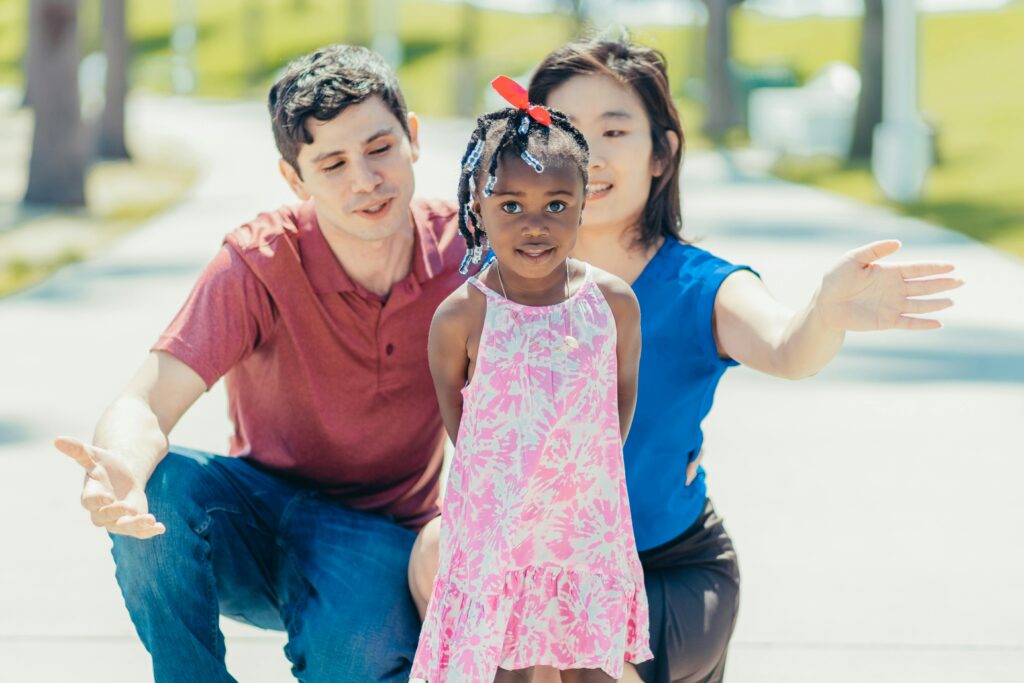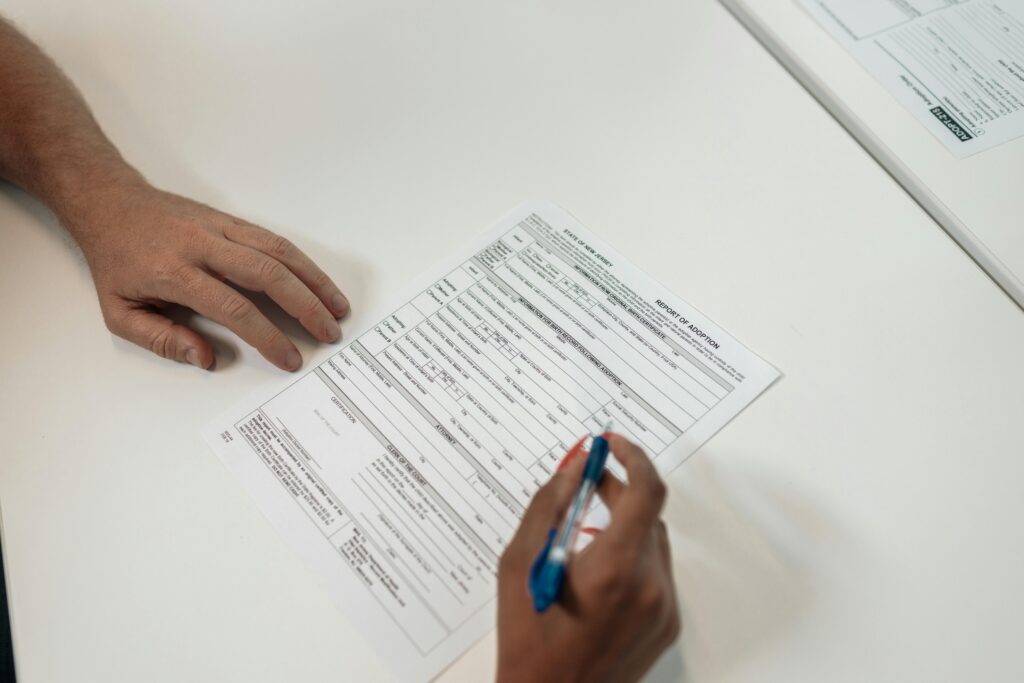Victor Ngaruiya- Legal Researcher

Adoption is the legal process of acquiring parental rights and responsibilities over a child. It is a complete severance of the legal relationship between a child and his/her biological parent(s) and the establishment of a new legal relationship between the child and his or her adoptive parent(s).
Adoption can be classified into three categories. i.e.
- International/ Inter-country adoption, which relates to applicants who are non-Kenyan citizens, seeking to adopt a child from Kenya.
- Local adoption, which refers to adoption of Kenyan children within Kenya by Kenyan Applicants
- Kinship adoption, which refers to adoptions by applicants who are relatives of the child within the extended family of the child.
Legal Framework Governing Child Adoption in Kenya

Adoption in Kenya is governed by the Children Act 2022 and the Constitution of Kenya 2010. Kenya is also a signatory to the Hague Convention on Inter-Country Adoptions that enforces international adoption standards. In addition, there is the Children (Adoption) regulations of 2024 that are still in its draft stages.
Step by Step Process of adoption

This part has been divided into two limbs, one where the adopter is a Kenyan citizen and the other is where the adopter is a foreigner.
Section 2 of the Children’s Act, 2022 defines local adoption to refer to an adoption in relation to which the child is resident in Kenya and the adopting parent or parents are Kenyan nationals’ resident in Kenya. While foreign adoption refers to an adoption in relation to which —
- The adopting parent or parents are Kenyan nationals with dual citizenship;
- The adopting parent or parents are foreign nationals whether or not resident in Kenya;
- The adopting parent or parents are not Kenyan nationals but are biologically related to the child; or
- The adopting parent or parents were once Kenyan nationals but have lost their nationality by operation of the law of the host country to which the prospective parent or parents have a nationality
- .THE ADOPTION PROCESS BY A KENYAN CITIZEN

Step 1: Understanding Eligibility
Before beginning the adoption process, it’s essential to understand the eligibility criteria. According to Kenyan law, prospective adoptive parents must meet the following requirements:
- Age Requirements: Adoptive parents must be at least 25 years old. If a couple is adopting, one partner must be at least 25, and the other must be at least 21.
- Marital Status: Both married couples and single individuals can adopt. However, single applicants must be at least 35 years old.
- Financial Stability: Prospective parents must demonstrate financial stability and the ability to provide for the child.
Certain categories of persons are exempted from having adoption orders made in their favor, unless the court is satisfied that there are special circumstances that justify the making of an adoption order in their favor. They include but are not limited to: –
- A sole male applicant in respect of a female child;
- A sole female applicant in respect of a male child;
- A sole foreign applicant;
- Persons of unsound mind within the meaning of the Mental Health Act (Cap. 248);
- Persons charged and convicted by a court of competent jurisdiction for any of the offences set out in the Third Schedule of the Act or similar offences.
- In the case of joint applicants, if they are not married to each other.
Step 2: Engaging an Adoption Agency
Adoption in Kenya is facilitated through registered adoption agencies. These agencies are licensed by the Department of Children’s Services and play a critical role in the adoption process. Here’s what to do:
- Research and Select an Agency: Choose a reputable adoption agency with a track record of successful placements.
- Submit an Inquiry: Contact the agency to express your interest in adoption and request detailed information about their process.
Step 3: Home Study Assessment
A home study is a thorough evaluation conducted by a social worker to assess the suitability of the adoptive parents. This includes:
- Home Visit: The social worker will visit your home to evaluate the living conditions and ensure they meet safety standards.
- Interviews: Both individual and couple interviews will be conducted to understand your background, motivation for adoption, and parenting style.
- Documentation: You will need to provide various documents, including identification, financial records, medical reports, and references.
Step 4: Application and Legal Procedures
After completing the home study, you’ll need to follow these legal steps:
- Submit an Adoption Application: File an application with the relevant adoption agency or the court, including the home study report and supporting documents.
- Obtain a Certificate of Eligibility: The agency or court will issue a certificate of eligibility if you meet all the requirements.
- Review and Match: The agency will match you with a child based on your preferences and the child’s needs.
Step 5: Pre-Adoption Training
Prospective adoptive parents are required to undergo pre-adoption training. This training covers:
- Parenting Skills: Techniques for parenting an adopted child, including understanding attachment and trauma.
- Legal Aspects: Information about the legal responsibilities and rights of adoptive parents.
Step 6: Placement and Supervision
Once a match is made, the child will be placed in your care. The placement process involves:
- Trial Placement: The child may initially stay with you on a trial basis to ensure compatibility.
- Supervision: During the trial period, a social worker will visit regularly to monitor the child’s adjustment and your adaptation to the new role.
Step 7: Finalizing the Adoption
After a successful trial placement, the adoption must be finalized through the court. The final steps include:
- File a Petition: Submit a petition to the court requesting an adoption order.
- Court Hearing: Attend a court hearing where the judge will review the case and make a decision.
- Obtain an Adoption Order: If the court approves the petition, an adoption order will be issued, legally recognizing you as the child’s parent.
The Adoption Process by a Kenyan in Summary
- Engage with a Registered Adoption Society: The process begins with a visit to a registered adoption society to initiate proceedings.
- Assessment: Both the applicants and the child undergo comprehensive evaluations by the adoption society.
- Home Visit: A crucial step involves a thorough assessment of the applicants’ living conditions to ensure suitability for adoption and the child’s welfare.
- Placement of Child: Upon satisfaction, the child is placed under the care of the applicants for a minimum of three months.
- Application to Court: An official application for adoption is submitted to the High Court, accompanied by requisite consents and reports.
- Guardian Appointment: The court appoints guardian ad litem to safeguard the child’s interests during legal proceedings.
- Adoption Order: If all criteria are met, the court issues a final adoption order, formalizing the legal transfer of parental rights.
- Registration: The adoption order is registered with the relevant authorities, culminating in the issuance of a certified copy as conclusive evidence of adoption.
ADOPTION PROCESS BY FOREIGN PARENTS

Step 1: Investigations by authorized bodies in receiving country.
- The adoption applicants have to meet the procedures in their home country before submitting their application to Kenya via an Adoption Agency.
- The couples must be assessed by competent bodies/ministries and criminal records must be checked before approval.
- Comprehensive medical examinations must be carried out including HIV status, and fertility checks.
- The financial status of the applicants and their suitability to bring up a child shall be evaluated.
- The couple MUST also undergo pre-adoption counseling in preparation for the big task ahead of them.
- These counseling sessions shall cover the adoption process, length of time, challenges to expect, the backgrounds of the children to be adopted etc.
- This will be followed by an application form for adoption being filled by the applicants through the Foreign Adoption Society and submitted with all the required documents.
Step 2: Formal Application to Kenyan Adoption Agency
- The Foreign Agency MUST ensure that all the documents required are in place before forwarding the application to the Kenyan Adoption Agency.
- Upon receipt of an application for adoption from a Foreign Adoption Society, The Kenyan Agency shall forward the same to the Kenya Adoption Committee within thirty (30) days from date of receipt.
Step 3: The Kenyan Adoption Committee
- This is the Central Body governing all adoptions in the country. This committee shall consider applications for International Adoption and shall either approve or reject it.
- The decision shall be communicated to the Local Adoption Society within thirty (30) days form the date such a decision is made.
Step 4: Communication of local Adoption Agency
A. Communication of Approval
- Where an approval for adoption is granted, the Local Adoption Society shall communicate the same to the Foreign Adoption Society within sixty (60) days from the date of receipt of the approval. This will be accompanied by: –
- A brief report on the children available for adoption at the time, who match the adopters’ preferences
- Information about the approximate length of time that the adoption process may take
- Relevant costs involved in the process
- A copy of the undertaking to be signed by the Foreign Adoption Society before conclusion of the adoption process.
B. In Case of Rejection
- Where an application is rejected, it shall be communicated to the Foreign Adoption Society within sixty (60) days from the date of receipt of such a rejection by the Local Adoption Society giving reasons for the rejection.
C.: Appeal in case of rejection
- In case of rejection of an adoption application by the Kenyan Adoption Committee, a Foreign Adoption Society may submit another application for adoption within six months from the date of rejection of the previous application.
Step 5: Travel and arrival to Kenya
- Upon receiving communication of approval, the Foreign Adoption Society will arrange for the prospective parents to travel to Kenya within three (3) months from the date of receipt.
- Upon arrival in Kenya, the Local Adoption Society shall receive the applicants and direct them to suitable accommodation/residence. The accommodation conditions must be assessed for suitability. (This involves a home visit by a social worker employed by the Local Adoption Society).
Step 6: Pre-Placement Counseling and Placement
- Before placement with a child the applicants MUST undergo a three (3) hour compulsory replacement counseling/training in preparation for receiving the child. This shall be done by a counselor attached to the Local Adoption Society
- The applicant /s will then be directed to the child/ren already identified for them. A two-week familiarization period is recommended while the child is still in the home. The child is then placed in the care of the prospective parents and a care agreement form is signed.
Step 7: Foster Period and Follow-Up/Supervision
- Upon placement with a child for adoption at least one of the prospective parents MUST reside in the country (Kenya) for three (3) consecutive months with the child.
- During the three-month fostering period, follow-up visits will be carried out to assess the bonding and adjustment of both the child and the prospective parent(s). The visits will be carried out as follows: –
(i). 1st Follow-up: – one month after discharge of the baby. Conducted at the Local Adoption Society’s office.
(ii). 2nd Follow-up: – Two months after discharge of the baby. Conducted at the Local Adoption Society’s office.
(iii). Final Follow-up: – three months after discharge. It MUST be conducted at the applicant’s home- to observe the adjustment of the child in the home environment.
Step 8: Legal Process
- If the prospective adopter(s) complete the placement period successfully the Local Adoption Society will assist them in identifying a suitable lawyer to represent their case in court. The legal process involves three (3) hearings (but could be more). Both applicants and the child MUST be present for the court sessions.
- Guardian ad litem (Friend of the child) will also be appointed by the National Adoption Committee to safeguard the interests of the child in the course of the court proceedings.
- Where an adoption order is granted, the Local Adoption Society shall notify the foreign Adoption Society within seven (7) days from the date of the order is made.
Step 9: Issuing of Adoption Certificate
- This document will be issued by the Registrar of Births and Deaths once the Adoption Orders are granted. It replaces the Birth Certificate.
- Therefore, the adoptive parents may only get a copy of the Birth Certificate (if available) but not the original. The process of obtaining an Adoption Certificate may take 3-5 working days.
Step 10: Traveling Out of Kenya.
- Ensure you have all the required travelling documents. These include;
(i). Adoption order and Adoption Certificate
(ii). Clearance letter from the Kenyan Department of Children’s Services-Ministry of Home Affairs to allow the child to leave the country
(iii). Travel documents (not Passport) issued by Immigration Department-Kenya
(iv). Visa- to be issued by receiving country’s Embassy in Kenya
- The Local Adoption Society shall assist the adoptive parents obtain these documents from the relevant authorities.
- Adoptive parents can only leave the country with the child once the Adoption Order is granted and all the above-mentioned documents are issued.
- The parents should contact the Local Adoption Agency if they need assistance with booking of the flight ticket.
Step 11: Post-Adoption Progress Reports
- The Foreign Adoption Society MUST send reports on the progress of the adopted child to the Local Adoption Society.
- These reports must be submitted once every three months during the first two years from the date of making of an Adoption Order, and annually thereafter for three years
IMPORTANT REQUIREMENTS

- The child must be at least six (6) weeks old and less than 18 years old;
- The child must be declared free for adoption by the adoption society;
- The applicant must have attained the age of twenty-five years and is at least twenty-one years older than the child but has not attained the age of sixty-five years;
- An adoption order cannot be issued in favor of the following persons unless the court is satisfied that there are special circumstances that justify the making of an adoption order:
- a sole male applicant in respect of a female child;
- a sole female applicant in respect of a male child;
- an applicant or joint applicants who has or both have attained the age of sixty-five years;
- a sole foreign female applicant.
The Child

Any child who is resident within Kenya may be adopted whether or not the child is a Kenyan citizen, or was born in Kenya. Further, the child concerned must have been in the continuous care and control of the applicant within Kenya. This should be for a period of three consecutive months preceding the filing of the application.
In addition, the law provides that the following children shall be eligible for adoption:
- a child who is an orphan and has no guardian or caregiver;
- a child who has been abandoned or whose parents’ or guardian’s whereabouts cannot be traced within a period of one year;
- children who are willingly offered for adoption by their biological parents in accordance with regulations made under the Act.
- Must be declared free for adoption by a registered adoption society
- Be evaluated and assessed by a registered adoption society
Who may apply for child adoption
Section 186 of the Children Act 2022, provides that either a sole applicant or two spouses jointly may make an application for Adoption.
The requirements for the applicant are that:
- The Applicant must have attained the age of twenty-five years,
- he/she should not be above the age of sixty-five years; and
- The applicant, or both of the applicants in a joint application, is/are more than twenty-one years older than the child.
- a sole applicant or one of the joint applicants is the mother, father or relative of the child.
Who cannot apply to adopt a child
The Children Act 2022 provides that the following are not eligible to make an application for adoption:
- is of unsound mind within the meaning of the Mental Health Act (Cap. 248);
- is incapable of exercising proper care and guardianship of a child;
- has been convicted by a Court of competent jurisdiction for any of the offense specified in the Third Schedule or similar offense;
- in the case of joint applicants, if the applicants are not married to each other;
- is a sole male applicant except where the applicant is a biological relative of the child; or
- is a foreign applicant except where the applicant is a biological relative of the child.
A check-list of documents needed
i. The child’s birth certificate
ii. If the child is a school going child, a copy of the school progress report
iii. A children officer’s report
iv. Death certificate for deceased parents of the child
v. Chief’s letter
vi. Home study report of the foreign adoptive parents prepared by a professional social worker.
vii. Recent photographs of the adoptive family.
viii. Marriage certificate of foreign adoptive parents.
ix. Certificate of medical fitness of adoptive parents duly certified by a medical doctor.
x. Declaration regarding financial status of adoptive parents along with supporting documents including employer’s certificate, where applicable.
xi. Income tax assessment order of adoptive parents.
xii. Bank references
xiii. Particulars of properties owned by the adoptive parents.
xiv. Declaration from adoptive parents stating willingness to adopt the child.
xv. Undertaking from the social or child welfare enlisted agency sponsoring the foreigner to the effect that child would be legally recognized as a citizen of the adopter’s country without any form of discrimination and that the child would be entitled to the same rights as those of citizens of that country.
xvi. Undertaking from the adoptive parents that adopted child would be provided necessary education and upbringing according to the status of adoptive parents.
xvii. Undertaking from the social and child welfare enlisted agency that report relating to progress of the child along with his/her recent photograph would be sent quarterly during first two years and half yearly for the next three years
xviii. Certificate from the enlisted social or child welfare agency sponsoring application of the foreigner to the effect that adoptive parents are permitted to adopt a child according to the law of their country.
Effect of adoption
- Duties and responsibilities
All rights, duties, obligations and liabilities of the biological parents in case of a first adoption or adoptive parents in case of subsequent adoption are extinguished and the same vest in and are exercisable by, and enforceable against, the adopter.
- Succession Laws
If the adopter or the adopted child or any other person dies intestate their property shall devolve in all respects as if the adopted child were a biological child of the adopter.
In addition, any disposition of property made, whether by instrument inter vivos or by will, at the date of an adoption order any reference to the children of the adopter shall be construed as, or as including, a reference to the adopted child.
3. Marriage Laws
An adopter and the adopted child shall be deemed to be within the prohibited degrees of consanguinity, and this shall continue to have effect notwithstanding that some person other than the adopter is authorized by a subsequent order to adopt the same child.
4.Work Injury Benefits Act
For purposes of this Act, a child whom a deceased employee had been authorized to adopt under an adoption order shall be deemed to be a member of the family of the employee, and an adopter shall be deemed to be the parent of a deceased child whom he had been authorized to adopt.
Get in touch with us

